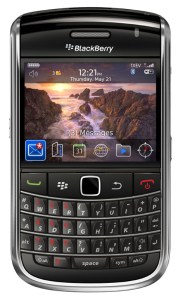
Saudi Arabia has become the second country this week to announce a ban on BlackBerry services, claiming that RIM’s offshore data services handling messaging and Web connections constitute a security risk because users’ data cannot be accessed by the government. However, Saudi Arabia is moving quickly: the Saudi Communications and Information Technology Commission has informed the country’s three primary mobile operators that they will need to shut down BlackBerry services August 6. The initial ban apparently applies to BlackBerry Messenger, although other services may be blocked as well.
Earlier this week, the United Arab Emirates announced it plans to block some BlackBerry services beginning in October over the same issues.
The core of the issue is how BlackBerry services are handled: rather than having data and messages being transmitted in the clear over a local mobile operator’s network, BlackBerry enterprise services encrypt messaging and Web traffic, which in turn is processed by data centers in North America and the United Kingdom. That means local governments cannot obtain BlackBerry users’ messaging and Internet traffic by issuing the local equivalents of subpoenas, warrants, and judicial orders to local mobile providers: instead, they would have to initiate international procedures with RIM and/or the countries hosting the data centers where particular information might be stored.
Complicating the situation, RIM’s enterprise services use symmetric key systems, where customers create their own keys. RIM and providers may be able to access the encrypted data, but only the customers can decrypt it; there is no “master key,” and RIM does not possess the customer keys.
The fear is that the comparative security of BlackBerry communications makes the phones ideal for criminals, militants, and terrorists. Free speech and human rights activists also note they can just as easily be used to protect politically-sensitive speech and other content.
RIM is also facing similar concerns in India. Indian newspapers (including the Economic Times) are reporting that BlackBerry services could be shut down over the same security issues.
Several reports have claimed RIM has attempted to negotiate deals with various governments to keep BlackBerry services operational; other reports have RIM claiming it has has never made any unique deals with any governments. RIM has not yet issued a public statement.
Editors' Recommendations
- This crazy case adds a BlackBerry-inspired keyboard to your iPhone
- BlackBerry trailer depicts the rise and fall of the iconic phone
- BlackBerry’s latest revival attempt crashes before launch
- The BlackBerry Key2 shows why software updates really matter
- A new BlackBerry with a keyboard is still on the schedule for 2022

